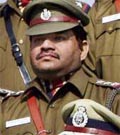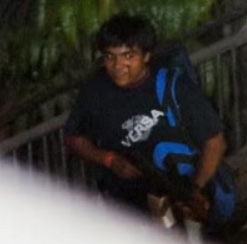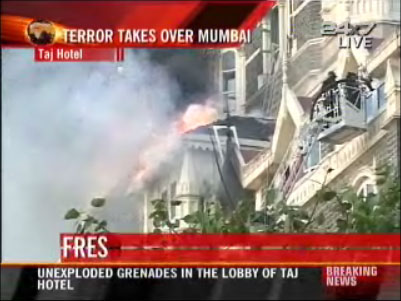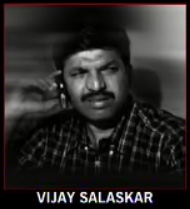And also those whoes profile is not added but killed in terrorist attack.
December 4, 2008
Give a tribute to our heres
Posted by Social Geek under BBc, CMS, HINDI, News, Olympic, php, Rediff, Songs, Sports, Welcome | Tags: Ashok Kamte, Bombay, Hemant Karkare, India, Major Sandeep Unnikrishnan, mohan chand sharma, Mumbai, terrorist, terrorist attack, Vijay Salaskar |Leave a Comment
December 3, 2008
Sign a Petition
Posted by Social Geek under News | Tags: advanced, destroyed, India, Mumbai, nationwide, Prime Minister, surveillance, systems, Terror Support Network |Leave a Comment
To: Prime Minister of India
3 (three) urgent steps that needs to be taken to send a signal to the perpetrators and as well as the victims that this time round Indian political leadership will take visible action and “Walk the Talk”.
Very Simply – We want “Assertive Action” in response to the recent terror incidents(mini-war) in Mumbai.
1)Destroy Internal Terror Support Network
Internal Elements/known suspects/peripherally suspected/passive helpers, residing in any part of India, supporting terror activities should be dealt with very severely.
2)Cripple the Source
26 Nov should be treated as India’s 9/11
a) All known training camps outside the country should be attacked and destroyed.
b) All known terror suspects hiding out openly in neighboring countries should be flushed out by mounting unprecedented global pressure on their governments.
3)Police force of all states to be better equipped, trained and the most advanced surveillance systems to be deployed nationwide on a scale that will by itself act as a deterrent.
Sincerely,
The Undersigned
December 2, 2008
Assam train blast 2 december 2008
Posted by Social Geek under News | Tags: AFP, explosion, Guwahati, India, Karbi Longri National Liberation Front, Karbi tribe, militant, passengerAssam, Police, police spokesman, railway station |Leave a Comment
GUWAHATI: Three people were killed and more than 30 wounded Tuesday in a blast that ripped through a passenger train in the northeastern state of Assam, police officials said.
A police spokesman said the explosion went off as the train was stopped at a railway station about 300 kilometers (190 miles) east of Assam’s main city of Guwahati.
One person died on the spot and two succumbed to their injuries at a local hospital.
“There are a large number of women and children among the casualties,” the spokesman said.
No militant group has claimed responsibility for the explosion, but the outlawed Karbi Longri National Liberation Front, fighting for an independent homeland for the majority Karbi tribe, is known to be active in the area.
Last 30 October blast claims 89 people and injured 200 people. 26 November terrorist attacked in Mumbai and killed at least 200 people injured 300 peole.
The Karbi Liongri National Liberation Front, enforcing an “indefinite economic blockade” on national highways and rail tracks in the state, allegedly planted the bomb in a general compartment of Tinsukia-Lumding passenger train which exploded around 8 am, police said.
Two passengers, including a child, were killed and 30 others injured, they said, adding that the injured have been rushed to hospitals.
District Superintendent of Police A K Sarma said that the police had beefed up security in the district in the wake of prior information about the militants’ plan to explode bombs in Diphu town, headquarters of Karbi Anglong district, besides Bokajan and Howraghat towns.
Due to intensified vigil, the militants failed to plant explosive devices in Diphu town and, instead detonated a bomb with a timer device inside the train as it was approaching Diphu railway station, he said.
The KLNLF has called the economic blockade of railway tracks and National Highways 37 and 39 in the district demanding responses from political parties to their 10-point demands, which include among others, exclusion of Karbi Anglong land from ‘Dimaraji’ as demanded by another militant outfit, Dima Halam Daogah (DHD), in neighbouring N C Hills.
Sarma said police has also recovered two bombs also suspected to have been planted by KLNLF militants at the Dokmoka area of the town.
December 2, 2008
India asks Pakistan for fugitives
Posted by Social Geek under BBc, News, Welcome | Tags: attacks, foreign minister, fugitives, India, Islamabad, militants, Mumbai, neighbours, Pakistan, Pakistan's high commissioner, Pranab Mukherjee, protest, settled in Pakistan, Tensions |Leave a Comment
India has asked Pakistan to hand over 20 fugitives from Indian law who it believes are settled in Pakistan.
Foreign Minister Pranab Mukherjee said India lodged a formal protest and gave the names to Pakistan’s high commissioner at a meeting on Monday.
Tensions have risen between the two neighbours since the attacks in the Indian city of Mumbai last week.
Officials say 201 people were killed – including 22 foreigners – and more than 200 were injured in the violence.
Indian officials have repeatedly said in recent days there is evidence the militants behind the attacks had Pakistani links.
Islamabad has denied involvement and warned against letting “miscreants” inflame tensions in the region.
India’s new home minister has vowed to “respond with determination and resolve” over the crisis.
December 2, 2008
India, US, Israel must ally against terror
Posted by Social Geek under BBc, News, Rediff, Welcome | Tags: American, anti-terrorist, attacks, attacks in Mumbai, Bangladeshi Hindus, Benkin, founder of Interfaith Strength, gigantic problem, government, human rights, India, intelligence, Islamist radicals, Islamist terror, Israel, Israeli intelligence, Mumbai, New York, Osama Bin Laden, puzzle, Richard L Benkin, South Asia, South Asian Islamists and Communists, United States |Leave a Comment
An American anti-terrorist and human rights expert on South Asia believes the intelligence failures in Mumbai were systemic and in some ways aped the failures of the United States before September 11, 2001.
Richard L Benkin, founder of Interfaith Strength, said in an interview with this correspondent that one gigantic problem in India is the lack of coordination among intelligence agencies that might have “different pieces to a deadly puzzle.”
“Although Israeli intelligence has been aiding India on a number of fronts, there was little or no multi-national coordination, and that is a particularly deadly mistake with regard to Islamist terror because Islamist terror is an international phenomenon and discreet national efforts will never defeat the enemy at its source,” Benkin said.
“The third systemic failure is the refusal of the Indian government to recognise that Islamist terror is an existential threat whose perpetrators will be satisfied with nothing less than the death of India as we know it,” he said.
By his admission Benkin has traveled to South Asia several times to free political prisoners, visit refugee camps, identify the alliance among South Asian Islamists and Communists, oppose Islamist radicals, and protest the ethnic cleansing of Bangladeshi Hindus.
Since the September 11, 2001 attacks on the United States, Benkin said there have been over 11,000 incidents of terror worldwide. He noted that even before the Mumbai terror attacks , terrorists had murdered over 1,100 Indian citizens this year alone. “What sort of rationalisations could convince anyone that these attacks are discreet and limited? We in the United States made the same mistake when we failed to see the same threat after the 1993 attacks on the World Trade Centre in New York,” he said.
“But I do not believe that these delusions are coming from the intelligence establishment itself. Clearly, these agencies are not independent operators and are held subordinate to the political structures and elected leaders in the nation,” he said.
“We have the same problem in the United States. To be sure, India and the United States are democracies and have certain standards of acceptable and moral behaviour but it is a particularly imbecility of our time that holds those structures incompetent if they do not demonstrate their power over the intelligence professionals in some public manner,” he said.
In response to a question whether or not anger generated by the attacks in Mumbai would be translated into a sustained government resolve to overcome terror, Benkin said the first and most important factor is recognising the fact that no matter what happens today, tomorrow, or the next day, or even if the US apprehends Osama bin Laden, the terrorist threat will be diminished perhaps for a time but in no way eliminated.
He said there is a need to recognise that the threat is a transnational one, needing a transnational response.
Benkin favours an alliance against extremism among India, Israel and the United States. “All three countries have been targeted for elimination by the Islamists — and if that is not sufficient motivation for strong action, it is rather impossible to imagine what is. Each of these three nations has withstood unrelenting terror attacks and still thrives,” he said. “Their power in an alliance would be unstoppable — so long as all three discard self-destructive notions like political correctness. Once those conceptual changes have been made, effective action is a matter of filling in the blanks.”
November 27, 2008
England cricket team calls off India tour
Posted by Social Geek under News, Sports, Welcome | Tags: cancelled, cricket team, Daily Telegraph, ECB spokesman, England, Foreign Office, Guwahati, India, Mumbai, Mumbai terror attack, Mumbai's Brabourne Stadium, Oberoi hotel, odi, Taj Mahal hotel, terror strikes |Leave a Comment
England cricket team’s ongoing tour of India cancelled following Mumbai terror attacks. The tour was thrown into doubt on Wednesday night after more than 101 people were killed in Mumbai attacks.
Earlier, England were waiting to hear from the Foreign Office before taking a call on the tour even as Cricket Australia suspended all travel to India.
“We will be guided by the Foreign Office,” an ECB spokesman was quoted as saying by the ‘Daily Telegraph’.
Mumbai’s Brabourne Stadium was supposed to host the second Test between England and India from December 19. The stadium is just stone throwing distance away from the Taj Mahal Hotel and the Oberoi Hotel, the scenes of the terror strikes.
The attacks happened after England crashed to their fifth successive defeat to India in Cuttack on Wednesday and reports claimed the terror strikes had left senior England team players concerned.
“We will be guided by the foreign office. We need to get a clearer idea of what the situation is before we react further,” said ECB media relations manager Andrew Walpole.
Even before the tour began there had been security concerns for the ECB after bomb blasts left dozens dead in Guwahati, where the sixth ODI is due to be played on Saturday.
November 27, 2008
City which never sleeps on knees
Posted by Social Geek under News | Tags: AK-47, Chhatrapati Shivaji Terminal, CST, Delhi, Gateway of India, Grenades, India, mediaperson, Mumbai, Mumbai police, New Delhi, nightlife, sleeps, Toyota Qualis |Leave a Comment
Mumbai, the city which never sleeps, was brought to its knees on Wednesday night as it came under an unprecedented multiple terror attack bringing areas from the South to the North of the metropolis under its grip.
As the siren blazing Toyota Qualis of the Mumbai police blazed passed, people could be seen running helter skelter, at times even crawling to save themselves from at least five near-simultaneous firings and explosions rocking areas in the vicinity of posh hotels in South Mumbai.
Even as heavily armed police stormed into Taj Hotel, just opposite Gateway of India where suspected terrorists were still holed up, blood soaked guests could be seen carried out into the waiting ambulances.
Bellboys could be seen rushing the injured out on luggage trolleys.
The scene at the nearby Trident hotel was more horrific as the glasses lay shattered on the ground even as fire could be seen raging out of the lobby.
Windshields of cars parked nearby had broken because of suspected bomb being set off at the hotel.
At the crowded Chhatrapati Shivaji Terminal (CST) railway station, hordes of mediaperson could be seen jostling for space as the area was cordoned off with no media being allowed near it even as an encounter went on inside.
Armed with AK-47 rifles and grenades, a couple of terrorists had entered the passenger hall of crowded railway station and opened fire and threw a grenade killing two to three persons on the spot.
The busy city, which is known for its nightlife, wore a deserted look as shops closed down even as police wearing bulletproof jackets could be seen frisking people in fear of terrorists taking advantage of the chaos to escape.
November 27, 2008
Mumbai blast update
Posted by Social Geek under News | Tags: एनएसजी, ऑबराय होटल, कमांडो, गोलियाँ, चरमपंथी, ताज होटल, पुलिस कमिश्नर, रेलवे स्टेशन, सेना, blast, Chief Ministor of Maharastra, India, Mumbai, R R Patil, terror attack, terrorist |Leave a Comment
At least 11 Policemen killed in terror attack in mumbai. Police said they killed 5 terrorist in many places after counter attack on terrorist. Mumbai Police loose 3 top police officers like Hemant Karkare, vijay salaskar and Ashok Kamte. Some people are still hostage in Taj Hotel, Trident hotel and Cama Hospital. Army comes out from barreck and enters in Mumbai town for resque opration. Chief Ministor of Maharastra said that terrorist attacked on 11 places in mumbai. Government says 76 people were killed and around 240 is enjoured.
No comment received from R. R. Patil yet ( He said once “Goli ka Jabab Goli se diya jayega”, still undergrounded.).
Prime Minister of India Manmohan singh condemn the terrorist attack (once again after Guwahati).
200 NSG commando 5 battalian Army enters in Mumbai. All Local train, Buses are cancelled.
Now fresh firing in Taj is heared. 4-5 terrorist are still inside the Taj Hotel, Many Taj staff are killed inside Taj. More than 100 people are still hostage in Taj.
Policemen in plain clothes have been deployed in huge numbers, while the Rapid Action Force has taken charge of the situation at the Oberoi.
The fire is raging uncontrollably in certain parts of the hotel, especially on top-most floor. Shreds of glass and embers are bouncing off the burning hotel. Ambulances have been rushed to the spot and are presently on stand-by.
Its attack on Marathi asmita but still we didn’t here any thing from RAJ THACKREY (THEy can bark against only Bihari, UP Walla ha ha ha….).
Every people fears again in mumbai no one is safe here.
Gunmen have carried out a series of co-ordinated attacks across the Indian city of Mumbai (Bombay), killing at least 80 people and injuring 200 more.
The situation is still confused but the city’s main train station, a hospital, a restaurant and two hotels – locations used by foreigners as well as local businessmen and leaders – are among those places caught up in the violence.
There are reports of gunfire and explosions taking place elsewhere in the city, and reports of a hostage situation at a hospital.
Is it realy terrorist attack or people celebrating the indian crecket teams winning in Cuttack. Ha ha ha Lol!!!
मुंबई में हुए चरमपंथी हमलों से निपटने के लिए केंद्र सरकार ने 200 एनएसजी कमांडो, सेना के 50 कमांडो और सेना की पाँच टुकड़ियाँ भेजी हैं.
पुलिस कमिश्नर से मिली जानकारी के अनुसार कई जगह चरमपंथी घुसे हुए हैं और उनके पास अत्याधुनिक हथियार हैं.
ताज होटल, ऑबराय होटल, रेलवे स्टेशन और एक और बिल्डिंग के ऊपर चार-पाँच चरमपंथी हैं और उन्होंने लोगों को बंधक बनाकर रखा है.
चरमपंथियों ने कई जगह अंधाधुंध गोलियाँ चलाई हैं और बहुत से लोगों को घायल किया है लेकिन अभी उनकी संख्या का पता नहीं चल सका है.
हेमंत करकरे इससे पहले रॉ में काम कर चुके हैं और एटीएस प्रमुख के तौर पर उनका कार्यकाल अच्छा माना जाता रहा है.
विजय सालस्कर मुंबई पुलिस के अधिकारी हैं जबकि अशोक कामते भी एटीएस के ही अधिकारी हैं और इन दोनों की भी मौत हो गई है.
मुंबई के चरमपंथी हमलों ने शहर की विरासत माने जाने वाले ताज होटल को भी नहीं बख्शा है और इस हमले में होटल को ज़बर्दस्त नुकसान हुआ है.
चरमपंथियों ने न केवल होटल में धमाके किए बल्कि लोगों को बंधक भी बना रखा.
होटल का अत्यंत सुंदर गुंबद टूट गया है और इसे धू धू जलते देख लगता है कि मानो मुंबई टूट कर गिर रही हो.
मुंबई की तस्वीर जहां कहीं भी दिखाई जाती है तो इसकी तस्वीर गेटवे ऑफ इंडिया और ताज होटल ही दिखती है.
यह मात्र होटल नहीं एक प्रतिबिंब है मुंबई में मौजूद इमारतों के वास्तुशिल्प का जो उस शहर के इतिहास की याद ताजा करता है. अब चरमपंथियों के इस हमले में होटल की सुंदरता को ठेस मिली है और शिल्प को भी नुकसान पहुंचाया है.
ब्रितानी काल में अंग्रेज़ों द्वारा बनाए गए सबसे सुंदर इमारतों में ताज होटल का नाम शुमार होता है. इसका निर्माण 1903 में हुआ था और जब यह बना था तो भारत का पहला लक्ज़री होटल था.
इसके निर्माण में क़रीब ढाई लाख पाउंड लगे थे और यह वो जगह थी जहां भारत के वायसराय महाराजओं और बड़े लोगों से मिला करते थे.
आज़ादी के बाद भी इसकी सुंदरता न केवल बरकरार रही बल्कि इसका महत्व भी वैसा ही बना रहा.
हर साल इस इमारत में बदलाव होते रहे और नई इमारतें जुड़ती रहीं लेकिन इसकी ख़ूबसूरती कभी घटी नहीं, बढ़ती ही रही.
अरब सागर की लहरों के थपेड़े हमेशा ताज होटल और यहां ठहरने वालों को थपकियां देकर सुलाते रहे लेकिन अब यहां आने वाले भी चरमपंथियों के हमले से सहम गए होंगे.
कह सकते हैं कि मुंबई के दिल पर किया गया यह हमला एक बार को पूरी मुंबई को झकझोर कर रखने की क्षमता रखता है.
इस ताज होटल का निर्माण 1903
November 26, 2008
India on a winning streak, take 5-0 lead
Posted by Social Geek under BBc, News, Sports, Welcome | Tags: Alistair Cook, Andrew Flintoff, Cuttack, England, Graeme Swann, Harbhajan Singh, India, Indian, Irfan Pathan, Ishant Sharma, Kevin Pietersen (Captain), Matt Prior, MS Dhoni (Captain), Owais Shah, Paul Collingwood, Ravi Bopara, Rohit Sharma, Sachin Tendulkar, Samit Patel, Steve Harmison, Stuart Broad, Suresh Raina, Virender Sehwag, Yusuf Pathan, Yuvraj Singh, Zaheer Khan |Leave a Comment
As captain MS Dhoni had promised, there was no dip in the intensity level after the series win and India comfortably won the fifth ODI against England by 6 wickets in Cuttack.
After a blistering start from Virender Sehwag and Sachin Tendulkar, India lost the momentum a bit as they lost three wickets in quick succession, but then Dhoni along with Suresh Raina consolidated India’s position. Dhoni (50) added 94 runs for the fourth wicket and also raised his 25th ODI fifty before Graeme Sawnn trapped him in front of the wicket. After the captain’s dismissal, Raina and Rohit Sharma saw their side home with 38 balls to spare.
England pacer Steve Harmison gave their side the first breakthrough as he dismissed Sachin Tendulkar for 50 runs. Sachin tried to play a good length delivery towards the cover but missed it and the ball crashed into the stumps. The master blaster became the first batsman to raise 90th one-day half-century. He added 136 runs for the first wicket with Sehwag. The duo had the 100-run stand for the tenth time in a row.
Yuvraj Singh was the second Indian to depart as he perished to a soft dismissal from Ravi Bopara for 6 runs. Bopara took a simple catch in his follow through to see the Punjab dasher back in the hut. Sehwag, despite his blitzing knock, missed out on his ton as Stuart Broad caught him plumb in front for 91 runs. In his 73-ball long innings, Sehwag slammed fifteen fours and a six to raise 33rd ODI fifty, his seventh against England and grabbed his second ‘Man of the match’ award of the series.
Earlier riding on their captain’s knock, England made 270 runs at the loss of four wickets. Electing to bowl first, India started off nicely as pacer Zaheer Khan struck twice to dismiss openers Alistair Cook and Ravi Bopara. Cook was first to depart, as a good length delivery that was going outside the off-stump took an outside edge of his bat and landed in the hands of Tendulkar at the first slip. He could make just 10 runs.
His opening partner Bopara survived a scare but finally perished for 24 runs. He tried to play it up but went straight to Yuvraj Singh standing at the backward point.
Kevin Pietersen (111*), who came after Cook’s departure, held the fort for his side. He first had an 89-run partnership with Paul Collingwood for the third wicket. Harbhajan broke their partnership as the latter holed out one in the deep to Zaheer Khan for 40 runs. In the next over of Ishant Sharma, new man Flintoff edged one to Sachin Tendulkar at slips without any addition to the score.
Pietersen was then joined by Owais Shah (66*) and the duo had an unbeaten partnership of 112 runs for the fifth wicket. While Pietersen raised seventh hundred, his second against India, Shah got his ninth ODI fifty. In the process, KP also completed 3000 ODI runs for England when he was on the score of 58.
India: MS Dhoni (Captain), Virender Sehwag, Sachin Tendulkar, Suresh Raina, Rohit Sharma, Yuvraj Singh, Yusuf Pathan, Irfan Pathan, Harbhajan Singh, Zaheer Khan, Ishant Sharma.
England: Kevin Pietersen (Captain), Alistair Cook, Ravi Bopara, Owais Shah, Andrew Flintoff, Paul Collingwood, Matt Prior, Samit Patel, Stuart Broad, Graeme Swann, Steve Harmison.














